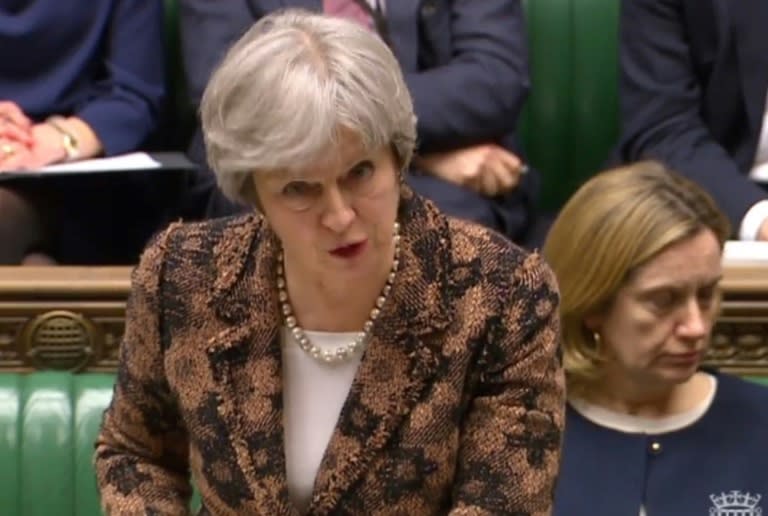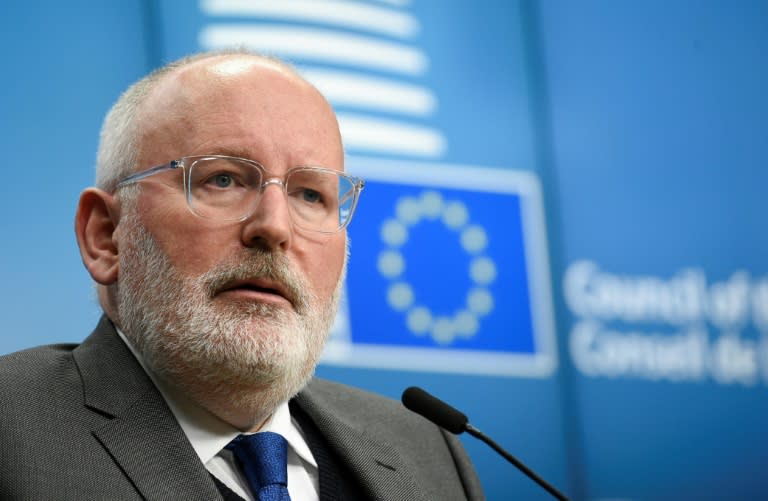In spy tussle with Russia, will the EU back up Brexit Britain?
Britain is keen for back-up as its espionage row with Russia escalates -- yet the diplomatic crisis comes at a time when its ties with European partners have been badly strained by Brexit. France, Germany and the European Union all expressed solidarity with London on Tuesday over the nerve agent attack on a former Russian double agent in Britain on March 4. France called the attempted assassination "totally unacceptable", while Chancellor Angela Merkel said Germany was taking claims of Russian culpability "extremely seriously". The European Commission meanwhile, through Vice President Frans Timmermans, said that European support was "unequivocal, unwavering and very strong". The issue "should be addressed by all of us and not just left to Prime Minister (Theresa) May and the British government -- it is a collective European responsibility," Timmermans added. The issue is likely to come up at a summit of all 28 leaders including May in Brussels next week -- their first chance to discuss the poisoning face to face. Four years after the EU imposed sanctions on Russia over its invasion of Crimea in Ukraine, members will now face a decision over whether to join Britain if it takes retaliatory action. May has promised unspecified measures if Moscow does not explain how the Soviet-developed nerve agent Novichok was used against Sergei Skripal and his daughter in the quiet British town of Salisbury. At stake is whether the EU feels it should back up London beyond expressions of support following Britain's decision to leave the bloc following its referendum in 2016. That choice has badly hit ties, with the complicated Brexit process leading Britain into conflict with its neighbours over its divorce agreement and future trading relationship with the bloc. "Any reasonable person looking at this terrible attack would come to the conclusion that Brexit is a completely different thing," said Francois Heisbourg, the head of the International Institute for Strategic Studies in London. "You will always find some Schadenfreude among some people, but chemical weapons are a serious thing," added the former French diplomat. Asked in parliament on Monday if she was working with the EU, other NATO countries and US President Donald Trump, May said she was keeping Britain's allies abreast of developments. Britain would "continue to talk to them to ensure that they are aware of what has happened on British soil and that we can talk with them about the response that we will be giving," she said. - Changing alliances - In a call between May and French President Emmanuel Macron on Monday evening, the leaders discussed "the wide pattern of aggressive Russian behaviour" and agreed it would be "important to act in concert with allies" to address it, according to a statement from May's office. Macron on Tuesday blasted the "unacceptable" nerve agent attack and expressed his "full solidarity" with the British government. He has begun his presidency insisting he wants to keep communication channels open with the Kremlin, seen as vital for his diplomatic efforts to find solutions to the Syrian civil war and the conflict in Ukraine. The 40-year-old French president might be reluctant to provoke Vladimir Putin ahead of a planned trip to Russia in May, which a French diplomat, speaking on Monday, said was still expected to go ahead. Moscow has denied any involvement in the attempted murder of Skripal. Britain faces the added difficulty that its famed "special relationship" with Washington looks increasingly weak. Trump has resisted imposing sanctions on Russia over alleged election meddling by the Kremlin in the 2016 US presidential election. The US President urged Moscow Tuesday to provide clear answers about the nerve agent attack and voiced US solidarity with London in a call with May. - Previous sanctions - The EU first imposed sanctions on Russia in March 2014 over the annexation of Crimea which included travel bans and asset freezes targeting people involved in or profiting from the invasion. It followed up with more sweeping economic sanctions targeting sectors of the Russian economy in July that year following an attack on Malaysian Airlines jet MH17 over Ukraine, blamed by the EU on Russian-backed rebels. Those measures, plus further sanctions imposed in September, were extended this week. "The UK can convince the EU countries to adopt sanctions against Russia, but it will be difficult," commented Sam Greene, head of the Russia Institute at King's College London. "I think Westminster (the British government) would like to have a strong reaction from the EU, but I don't think it will happen." adp-burs/kjl/pvh



